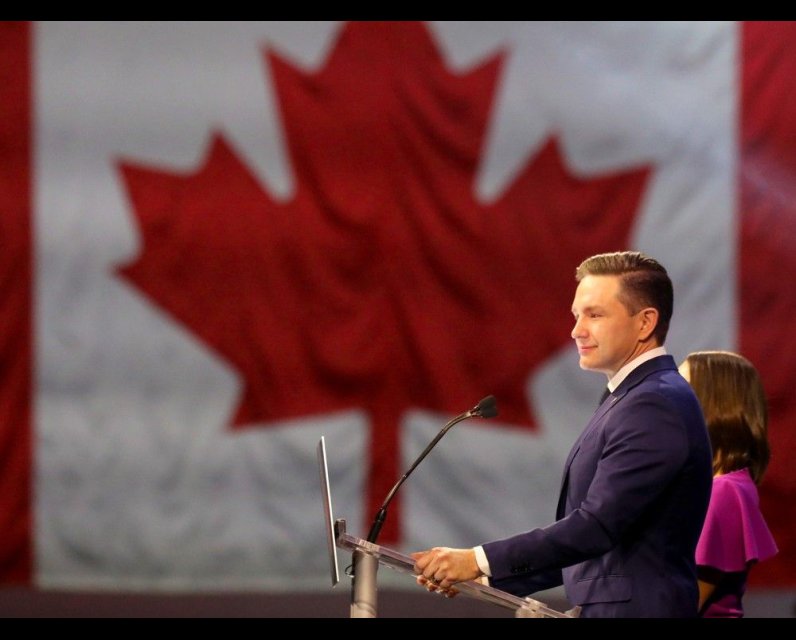Source Feed: National Post
Author: Stephanie Taylor
Publication Date: April 28, 2025 - 15:49
'We have to learn the lessons of tonight': Poilievre signals he'll stay as leader, concedes election
April 28, 2025

OTTAWA
—Conservative Leader Pierre Poilievre signaled early Tuesday that he intends to stay on as party leader, touting the gains the party made in an election he ultimately lost.
Speaking shortly before 1 a.m. ET, Poilievre did so before the results had yet to be finalized in his own riding of Carleton, which turned out to be a closer-than-expected fight against Liberal challenger, Bruce Fanjoy.
As of around 1:45 a.m. ET, Elections Canada was reporting 220 out of 266 polls, which showed Poilievre trailing Fanjoy.
As he spoke, Poilievre touted the fact the party made historic gains, adding at least another 20 seats to the around 120 it already had, heading into Monday’s election.
However, Poilievre acknowledged the Conservatives’ efforts fell short.
“We know that change is needed, but change is hard to come by,” he told several dozen supporters.
“It takes time. It takes work, and that’s why we have to learn the lessons of tonight so that we can have an even better result the next time,” he said.
As he congratulated Liberal Leader Mark Carney, a smattering of boos erupted from the crowd, which Poilievre signalled to stop.
“We’ll have plenty of opportunity to debate and disagree, but tonight we come together as Canadians,” he said.
“We will do our job. Yes, we will do our job to hold the government to account, but first, we congratulate people from all political backgrounds on participating in the democratic process.”
Before he spoke, disappointment and last-minute nerves settled over the party’s headquarters as election results rolled in showing the Liberals reelected to a historic fourth consecutive government.
The results represent a stunning reversal of fortune for Poilievre, who until last month’s campaign call, had spent the past 18 months with a commanding lead, which was swallowed up by the exit of former prime minister Justin Trudeau and U.S. President Donald Trump’s trade war.
Poilievre called the Liberals’ minority win “razor-thin.”
Party faithful expressed a mix of confusion and disappointment, as well as bursts of hope as they watched the results roll in, as many showed tight races.
One woman wiped away tears as she saw a Liberal win projected. Another woman openly questioned how the party could possibly be losing.
“Very disappointed in whoever voted Liberal,” said supporter Mike Booth. “A lot of friends have voted Liberal.
“It was solid ’till Trump opened his mouth, I guess, about tariffs, and everybody jumped on that bandwagon and turned it against Poilievre being a somewhat close to Trump or like Trumpster-type guy.”
A crowd near the front of the room erupted into cheers of Poilievre’s slogan of “bring it home,” as they saw the projected seat count change throughout the night.
The 45-year-old was first elected to the House of Commons in 2004. He launched his bid to become Conservative party leader in February 2022, just days after the party’s caucus chose to eject its former leader, after months of internal turmoil.
He became the third Conservative to lead the party within five years, with his two predecessors’ exits precipitated by back-to-back election losses.
The question before Poilievre is now whether he can escape a similar fate. For Conservatives, Poilievre’s rise to power had been predictable for many.
Known as a hard-working hyper-partisan who knew how to sell the Conservative message and had a knack for getting under Liberals’ skin with his brash style in Parliament, Poilievre nearly entered the contest two years earlier, but bowed out at the last minute.
When he eventually did run, Poilievre did as a populist and won the 2022 leadership in a whopping first-ballot victory, winning a stronger mandate than even Stephen Harper, the last Conservative prime minister to hold power.
When the Conservatives were in government under Harper, Poilievre made a name for himself, first as an MP and then later as a minister, as an energetic and forceful defender of the government’s record, which critics said was overly aggressive and at times over-the-top.
His instincts to fight were put to good use after 2015 when the Liberals were elected and the Conservatives found themselves relegated to the Opposition benches.
Poilievre, named as the party’s finance critic, got to work mounting eye-catching prosecutions of the Liberals’ spending and scandals, building a social media following, including through his own YouTube videos, which would later come to define his brand as Conservative leader, particularly among young people and especially young men.
During the height of the 2020 WE Charity scandal, an organization that was awarded federal money which former prime minister Justin Trudeau had personal connections to, Poilievre called a press conference only to toss around papers, lambasting the government for redacting information.
Such was the type of flare Conservative supporters came to expect once Poilievre became leader.
He did not disappoint.
In 2023, an exchange Poilievre had with a local reporter went viral, as the reporter asked him about his likeness to Trump, questions that Poilievre batted away while casually crunching on an apple.
As Conservatives gathered for their the party’s convention in Quebec City that September, it looked like they were heading for victory, with for the first time public opinion polls suggesting Poilievre was taking the lead, as Trudeau grew more and more unpopular.
The Conservative lead only grew bigger and bigger, which prompted Poilievre to start calling for an election.
The party was raking in millions, smashing fundraising records, and the Conservative caucus appeared to be squarely behind the leader, reciting slogan-after-slogan that Poilievre felt was key to get Canadians to pay attention.
All that swagger from the past 18-months was nowhere to be found once the election got underway, however.
A series of events happened that upended the Conservatives’ once comfortable chances at winning. First, Trudeau stepped down, meaning the prime minister Poilievre had badly weakened would no longer be on the ballot.
Then Carney, a two-time former central banker, replaced him.
At the same time, Trump’s trade war, the drums of which the American president began beating last fall, quickly overtook Canadians’ concerns about the cost-of-living, which Poilievre had successfully championed for the preceding months coming out of the COVID-19 pandemic, as Canadians saw their mortgages and food prices rise, thanks to interest rates and inflation.
Instead of jumping on the message of presenting a “Team Canada” approach to Trump’s threats, a name Trudeau revived from the president’s first term in office, Poilievre largely kept quiet on the issue of tariffs, deciding to instead stick to talking about the affordability issues he wanted to, embodied by his call for a “carbon tax election.”
That phrase was nowhere to be heard on the campaign trail though, especially after Carney made one of his first moves as prime minister to zero the tax rate, resulting in gas prices falling at the start of April.
In response, Poilievre doubled-down, taking aim at the industrial carbon price and encouraging voters to see Carney’s decision as nothing more than a distraction.
Throughout the campaign, Poilievre demonstrated he was not in the business of pivoting, something other Conservatives grumbled he needed to do to refocus his campaign message on Trump and his tariffs, a call no one made more loudly than Kory Teneycke, Ontario Premier Doug Ford’s last campaign manager, who described the federal Conservatives blowing their 20-point lead as “campaign malpractice.”
While Poilievre bucked the calls for him to pivot, he did, however, try to soften the edges of his often intense-sounding tone, sporting more smiles and cutting out the sparring he would often do with reporters, especially those in the Parliamentary Press Gallery.
Still, Conservative candidates and those in local campaigns said his aggressive style was coming up at the doors, especially for older female voters, repelled by any resemblance to Trump.
National Post. staylor@postmedia.com
1
2
const title = "Poilievre’s By-Election Bet, Ford’s Power Ploy, and Blanchet on the Back Foot";
const date = "July 12, 2025";
const data = [
{
image: "https://walrus-assets.s3.amazonaws.com/img/WAL_Web-BattleRiver_JUN25_005-1536x1024.jpg",
title: "Poilievre Is Parachuting into Rural Alberta to Win Back His Seat",
url: "https://thewalrus.ca/poilievre-is-parachuting-into-rural-alberta-to-win-back-his-seat/",
question: "After losing his seat in the federal election, Pierre Poilievre is now seeking redemption in one of Canada’s...
July 12, 2025 - 06:00 | Kayla Thompson | Walrus
After her breast cancer was detected in the fall of 2023, Martine Riopel’s weekly routine started every Monday morning with a visit to her local hospital in rural Quebec for blood tests. Then, she and other patients chatted while they waited for their physicians at the oncology ward.It was during one of those chats that she heard about the hospital’s plans to close its emergency department in the evenings. “People were stressing about it and it stressed me, too,” she recalled. “I said to myself, ‘No way.’”
July 12, 2025 - 06:00 | Ha Tu Thanh | The Globe and Mail
The owner of Woodstock Duty Free Shop says he used to see about 200 customers daily in the summer months. Now, he gets about 20.
July 12, 2025 - 05:00 | Suzanne Lapointe | Global News - Canada



Comments
Be the first to comment